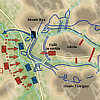

The unit that has made possible the formation of the largest and most powerful empires of ancient world, resides in a word that, for centuries, till the present days, is almost a legendary icon in the collective imagination of the entire world historiography: the Legion. But even if legendarily, solid granite, the backbone of the Roman army has undergone, over the centuries, in mutations in its more important components, as in the weapons as even in the structure itself. From the early, the first manipula formation, the Legions of Rome were composed, as noted, by citizens called to arms to defend the City, and the honor of their ancestors from uncomfortable neighbors as were the Italic peoples on borders of Rome itself. But with the expansion of the Roman empire, and the consequently hate and the increase of the conflicts that had to be borne by the Capitol, it was necessary not only a reform of the weapons used by the legionaries, but a reform of the Legion itself. With Gaius Marius, the Legion became more professional, adapts to the military needs of a state in expansion on disparate fronts against opponents of military traditions totally poles apart. Moreover, even the Roman society was changing, no longer confined within its walls, but was sweeping across the Mediterranean and beyond in the inner regions. The Legion has less and less so on the factor of "indigenous" of Roman citizens and increasingly on professional soldiers (but mind you, not mercenaries) whose services, however, were increasingly binding to their leader rather than to the ideal represented by Rome itself. But the reform of Mario, perfected so much the army of the late Republican Rome, to transform it in a steamroller, able to deal with almost any menace, so to overshadowed any threat to the stability of republican institutions. Not surprisingly, the success achieved by the legions of Marius, Pompey, Sulla and Caesar led the Roman expansion at a level so high as to cheer the just mentioned commanders almost as deities, obscuring the central importance of the Senate as a representative of the whole Roman people. Rome was now a slave of its successes, and this successes were brought not by the citizens but by their brave general who soon had the chance to drop the republican institutions to give birth to the imperial ones. But from here, it generates what will be, with the passing of centuries and not years, the element of the same order of magnitude in Rome. The success, the power, the glory and riches of Rome with the passing of time it will be his own undoing: the Legions, no longer formed by the citizen- soldier as before, will be more concerned with their own economic fortunes than to those of the Empire, the emperors will be increasingly involved in struggles for power, less and less interested (with some wonderful exceptions) and the expansion started to look more to the defense of the “limes”, all this until, they do not recur, in the last imperial phase, to hire even barbaric elements in their ranks. This option will be one of the reasons for the collapse of the greatest empire history has ever seen. But from its ashes, will arise a series of kingdoms that will be the ancestors of today's European states (France, Spain, England and part of Germany) that have colonized much of the known world.
Battles

499 or 496 BC
Nearby the ancient Lake Regillus (an actual plain just under Rocca Priora) the roman army, under the command of Aulus Postumius Albus Regillensis, despite the outnumbering, defeated the troops of the Latin League, leaded by Tarquinius Superbus and Octavius Mamilius. The defeat of the first and the death of the second will means, for Rome, the end of the kings age, and the beginning of another, new, golden era: the republican one.

493 or 491 BC
Believing in the chance of take advantage of the first Roman social crises, Sabines, Equi and Volsci simultaneously attack the territories of the City and its allies. Newly appointed Dictator, Manius lead an incredible campaign, on three parallel fronts, which will end with the inconceivable Roman victory near Crustumeria.

487 or 485 BC
Only one-third of the then entire Roman military complex is sufficient to break the resistance of the Ernici, believed responsibles for a series of looting in Roman territory, while the latter were committed against the Volscians. The Battle of Praeneste, which was won by the legionaries under the command of the consul Gaius Aquilio, will force them to accept Roman rule.

487 or 485 BC
Thanks to the victory over the Volsci, near Velletri, the consul Titus Sicinius, not only obtained a triumph that obscured the simultaneous victory over the Ernici of the fellow Caio Aquilio, but closed the entire campaign for which the two consuls were appointed.

216 BC
The battle of Cannae was the key battle of the Second Punic War and is still considered a masterpiece of military tactic, the most successful example of an encirclement maneuver accomplished by an army numerically inferior to the opponents.

202 BC
The decisive victory of Scipio on Hannibal closed the Second Punic War and giving to Rome, once for all, the supremacy in the Mediterranean.

197 BC
At the battle of Cynoscephalae, known, in military terms, as the "encounter battle", the legions of Flamininus attack the phalanx of Philip V, while they are still in the deployment phase, routing them.

September 52 BC
At the siege of Alesia, Vercingetorix's defeat causes the end of gaul civilization and began the establishment of the neo-Latin culture and Provencal French.
| Home | Battles Index | Cartography | Chronology | Forum |